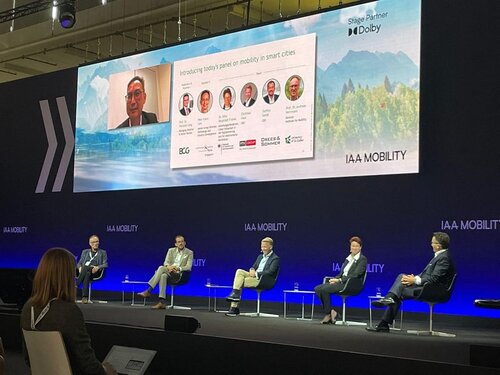Meet decision makers and industry leaders from all mobility sectors
Representatives from the automotive and tech industries as well as MaaS providers
City decision makers and many more
VISIONARY CLUBHOUSE POWERED BY DREES & SOMMER
The future of mobility is being shaped by visionaries and farsighted individuals from across the mobility ecosystem - far beyond the automotive sector. That's why the Visionary Clubhouse was created at the IAA Summit - as a space where thought leaders from different mobility sectors can meet, share their expert opinions with an interested B2B audience and make new contacts.
Theme of the day BUILDING THE FUTURE MOBILITY
Tuesday, 5 September 2023 is the opening day of the IAA Mobility with an address by the German Chancellor and a large number of C-level and political representatives.
On this day, Drees & Sommer will host the Visionary Clubhouse from 10:00 to 18:00 with an interdisciplinary theme day on mobility, smart city and smart factory.
Yellow Stage | Hall B2
Involving people in the transformative processes of mobility is essential. While some people are happy to use shared mobility concepts, others do not want to lose the routine and independence of owning a car. We discuss how to involve people in innovative concepts and technological solutions.
The mobility forms and systems of the future need good arguments to be accepted by society. In this context, it is important to consider both the costs and the habitual behaviour of people.
Moderation:
- Michael Konopka, Drees & Sommer
Panel Participants:
- Ekaterina Koch-Lichtenstein, Strategic Urban Planner at the City of Aachen
- Dr. Olga Nevska, DeTeFleetServices (Telekom Mobility Solutions)
- Reza Razavi, Expert for Corporate Culture, Change and Transformation
- Sophia Rödiger, CMO von 1komma5° and Serial Entrepreneur
- Tristan Scheler, Hive Systems
Panels @ Visionary Clubhouse | Hall A2
PANEL 1: FUTURE MOBILITY
Whether air taxis, cable cars, magnetic levitation trains or hyperloop systems, the new mobility concepts must be sustainable and efficient. In addition to these arguments, seamless connectivity also plays a role. The new technologies offer both opportunities and challenges. The panel will discuss whether these innovations will become game-changers and how best to integrate them into existing infrastructures.
PANEL 2: HOW MOBILITY SHAPES THE CITY
Getting around faster on an e-scooter, using the cycle paths or taking the train with a €49 ticket? People use different ways to get around the city - and this mobility interacts with the built environment. This raises the central question of what forms of mobility will play a role in cities in the future and what impact they will have on public space. How will cities need to adapt to new needs and what will the street space of the future look like? The panel will discuss how different forms of mobility are changing the city.
PANEL 3: STRATEGIES FOR COMPANY-MOBILITY
For companies, mobility means change. To remain sustainable and fit for the future, they need to adapt their corporate mobility strategy. This may mean changing the vehicle fleet or integrating public transport into the strategy. The panel will look at how companies can reduce their environmental impact, adapt to the needs of their employees, and at the same time remain economical and efficient. Representatives from business and the public sector will discuss possible actions that companies can take. They will also discuss how to involve relevant stakeholders in the process.
PANEL 4: THE CAR AS A NICHE PRODUCT
The perspective has changed - the central question is no longer how the car gets from A to B, but how and with what people get from A to B. The range of mobility options is growing and changing. The range of mobility options is growing and changing. Discussions about equal transport and the "15 minute city" reinforce the idea of the car as a niche product. Aspects such as work-life balance, people's health and the environment play a central role in this question. This panel will discuss the USP of the car in the future and how much it still shapes public space.
PANEL 5: FUTURE INDUSTRY AND E-MOBILITY NEED SUSTAINABLE ENERGY SOLUTIONS
The e-mobility and alternative energy market needs sustainable and efficient solutions. When it comes to hydrogen and e-fuels, the generation and production of the fuels is a challenge. From photovoltaics to wind power to electrolysis, the path to alternative energy is diverse and challenging. Sustainable fuels also mean that engines and powertrains need to be adapted. In addition, legal regulations must be complied with in order to meet ecological requirements. This panel will also look at the infrastructure needed to ensure a reliable supply of these new fuels, and the changes this will bring to existing processes.
